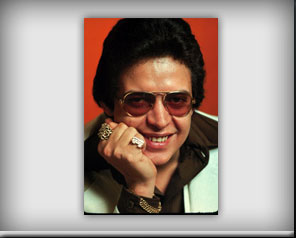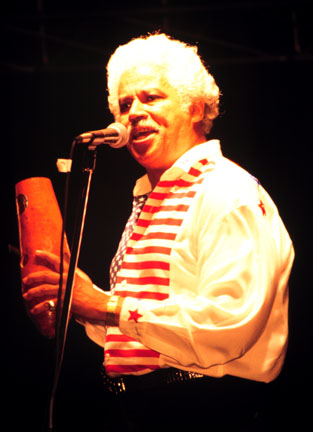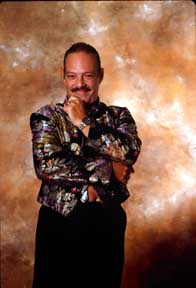
Interview with Johnny Pacheco about Hector Lavoe
by Mary Kent Photos of JP & LH by MK, ©1997. All rights reserved.
HL photo provided by Fania
- How did you meet Hector?
I was working at the club Havana San Juan on Broadway and 139th Street. That's when I started Pacheco y su Tumbao. I used to see this skinny kid sit by the bandstand and listen to the group. One day he asked me if he could sing with the band. I had no idea who he was. Y yo le digo, "Y ven aca. ?Tu eres cantante?" He says yeah, I can sing.
Pete was singing with me at that time. Pete Conde Rodriguez. Until one day I said, what song can you sing? And I used to play La Mujer del Peso , Chivirico Davila used to sing it. So I got Hector up on stage and he sang it. I was flabbergasted. It was an unpolished diamond. I liked the quality of his voice, but at that time it was a little thin, because he was very young. But he had this flavor that I loved. Right off the bat I knew he was going to make it.
And then he used to come in on the weekends and sit in with the band. That's when I started recording Willie Colon and Willie didn't have a singer to do his album. Al Santiago was in the process of recording Willie Colon. That's when we, Fania, bought some Alegre tapes. So when I grabbed them, we had a tune, he had a tune that was going to be a bomba and I changed the rhythm because I'd just come back from Africa. I did a mixture of things and that's when we did Che Che Cole. So I got Willie and Hector together and that was the perfect combination. It was the beginning of something incredible. That's how I met Hector Lavoe.
- What was it about him that made you think that he had star quality?
Since the the beginning, he had a very inventive mind. When it comes to ad-libbing, he used to come out with stuff, and he was just starting. I said this guy is going to be unbelievable. The ad-libs that he did, not only were they with good humor, but they rhymed and they were great. Another thing that I liked was that he had a great range. He used to sing high and he could hit the low notes, which is very important in a singer. He started to get better and better.
- Do you know if he had any kind of voice training?
Never. No training at all. God gave him a gift.
- His voice was thin at the beginning because of his youth. It started developing?
It started to develop and got a wider sound. We call it pastosa. And this guy for all the years we were together never got hoarse. Sometimes he didn't sleep for days and he used to go into the studio and have that timber...
I want to give credit to a guy, his name is Arturo Frankis. He was one of the greatest promoters. He was the one that named him Lavoe. He used to say, "Ese si tiene La Voz"
According to what I know, and I know a lot about Hector, he was the one that named him Lavoe.
And who was Hector singing with at the moment?
With Willie.
- We know that he had problems with drugs. Were you always aware of those problems?
Yeah. And we tried everything. We got him into programs. We even got him on acupuncture. There was a time that he had a needle in his ear, but nothing worked.
- Did you produce many of his albums?
 Most of them. (Johnny Pacheco in photo at left)
Most of them. (Johnny Pacheco in photo at left)
- What was special about him and how did you help bring out the best in Hector when you were producing him?
The first thing I want to say is, I can vouch for this. Beleive it or not, every time we went to work in the studio, he was never late with me, which is incredible. To be recording with him was like a carnival. He was very funny and took everything like a joke, till it came to working, and I said, "Let's get serious." And he says, "Quiero que me esprimas. Squeeze everything out of me." And that's what I did. Because he wanted perfection.
- And how did you squeeze it out of him?
Because we got along very well and there was a lot of respect between the two of us. I was like his father. Anything he needed, he'd call me. He confided a lot in me.
He was very loved, not only by the public because I never saw a funeral like that, but he was loved by his fellow musicians. When he had the accident in Puerto Rico, I contacted everyone that had to do with the Fania Allstars, and all the big guns went and did the benefit, and we came up with about 65 to 70 thousand dollars. We took that money and paid for all his medical expenses, his rent and everything. Ruben Blades, Ismael Miranda, Pete El Conde Rodriguez, Cheo Feliciano, Quintana. All the money we collected went to Hector. And we did a Hell of a concert.
- Was there any explanation at that point, of why he tried to commit suicide?
He landed in front of me. I had the suite where he landed. And I heard the thump and I heard the commotion. I didn't know it was him. He landed on his hands and feet. When you commit suicide you jump and you land on your belly or your face. There was not a scratch on his face, because I took him to the hospital. When I saw it was him, and he started to answer me, I thought he was dead. I couldn't believe he was alive. This is the impression I get. 'Cause he was always clowning around. But he had problems because his son got killed, his father died and he said that somebody was calling him. I don't know if that triggered the whole thing. I don't know if he jumped or fell. Maybe he changed his mind, because if you land on your feet, you're not trying to commit suicide.
-So you never asked him what happened?
No.
You were so close to him, why wouldn't you ask him, "What happened?"
If he was alive, I didn't want to bring any memories back. Maybe something that happened at the spur of the moment that, I didn't want to trigger that again. Because if he changed his mind, I guess he got the will to live.
- Are there any stories?
The only thing I can remember, which is a classic Hector LavoeWe went to Cuba with the Fania Allstars, Chris Kristopherson, Stephen Stills and Nash. Columbia Records put this togehter. The only guy that was missing was Hector Lavoe. And I said, that son of a b is not going to make it. And when we were ready to go on, he shows up on stage. And I said, "how did you get here?" And he said, "I flew." To this day I don't know how the hell he made it to Cuba.
What year was that?
About 1980.
Hector Lavoe left a lot of good music, and we should listen to it. I am listening to stuff that Polito played on the show he dedicated to him and I started going nuts because I heard stuff that I recorded that I hadn't heard in I don't know how many years. I made a promise that I was going to get all his tunes to have at homebecause every time people come to my home, they take my records.
Interview with Larry Harlow
How did you meet Hector?
We were actually all Willie Colon, my band with Miranda, Bobby Valentin's band, we all came up at the same time. I was ten years older than everybody because I didn't start my band till I was 29. So Willie and Hector were probably 18 or 19 years old at the time. But we all worked the same places: Hunts Point Palace, the Colgate Gardens, the Psycho Room, you know, $1.50 Sunday afternoon for ten bands. I got a lot of my guys from Willie's band. The only one I probably didn't steal from Willie was Willie and Hector. But Nicky Marrero came from Willie's band to my band Joe Santiago, Frankie Rodriguez. And they were all friends from the Bronx 'cause they were all Bronx guys.
- So did you meet Hector at one of the club gigs?
Probably yes, and casually. It really wasn't until later on, til the late '60's or early '70's when the Fania All Stars were just forming, and Hector and Willie were starting to make some hits in the Che Che Cole days that I started digging on Hector musically and what he was singing and his poetry.
When you say poetry, what are you referring to?
He was a poet. His inspirations, his songwriting. His message to the kids. He was the Barrio Poet. He had the message of the street kids. I don't think he was that great of a "musician." For example, if Nestor Sanchez takes a chord progression, his voice would be his instrument and he improvises. He'd play jazz. Hector was melodically, more on a monotone scale, but his poetry, the words he was saying and the words he was writing, was very down to the kids in the street. It kind of laid over into his personality, too, and he always remained the street kid. When it was party time there were always a lot of girls, a lot of partying, a lot of sexual stuff. A lot of drugs, a lot of boozing. A lot of after hours and getting busted, taking vitamins, staying up for three days.
-Do you think it had anything to do with the fact that you all were living in the '60's?
Right. Free love time. I mean, we used to go up in the bandstand and go "You, you, you, you, you, and go home with five girls of your choice. But everybody married young too. I was on my third wife at that time. But I remember Hector and Willy's sister, Cindy. We were all pretty wild in them days.
What I do remember about Hector is that a lot of his inspirations were things like, "After I'm dead, remember that I told you this" Or "After I'm gone, let me leave this message for you." A lot of his inspirations he would say things like that. He would say, "Remember me when I'm gone." And this was before he was really sick.
- So these were not lyrics that were written out for him?
No, no. On whatever song it was, suddenly he would say, "Reme.ber that after I'm gone, that I still love you." The people from the barrio, especially from upper Manhattan and in the Bronx. Willie and Eddie Palmieri did the Bronx all the time. They had the Bronx sowed up. I was more Brooklyn and lower Manhattan, up to maybe 96th street. I used to hang more with Barretto and Pacheco, those were the Cuban clubs.
At the funeral, I carried Hector's coffin with Ismael. It's funny because I was with Miranda in Puerto Rico about two or three months before Hector's death. He was born in Ponce and Hector had been told he had three months to live. Ismael had been talking to the governor of Puerto Rico about getting Hector to live his final days in a hospice in Ponce, with full medical and nursing, room and board and everything on the government of Puerto Rico. It took months to convince the Governor. Fianlly he o.k.'d it. Hector was in Miami at the time. Ismael flew to Miami to pick up Hector and bring him back to Puerto Rico and Hector had left the place in Miami and had come back to New York. This was nothing new to Ismael so he took it with a grain of salt. I would have been furious.
His death was a shock. It hurt me. I don't go to too many funerals. I'm a very emotional guy. I went to Louie's funeral (Ramirez) and I cried. We went to the cemetery. The turnout of people was great. It just got out of hand. Everyone was pushing to get closer to the casket and to the grave site. Bobby almost fell into the hole. I had to grab him by his belt. So we backed off.
The church ceremony was about an hour and we had a limousine and they must have had a hundred cars in the procession, with Puerto Rican flags hanging and music blaring and I said, Are you7 going right to the cemetery? Yes. Well, we waited 5 1/2 hours for the funeral procession. They went, took him to Avenue A, to Alphabet City, 10th street, 11th street, you know, where he used to cop all his drugs, at a snail's pace. And then they went to Orchard Beach and paraded him around Orchard Beach in the rain. He's buried very close to La Lupe. And he's buried next to his son.
He was a fun guy. Of course he wore the craziest clothes ever. He used to wear bright green with purple, plaid suits, the wildest colors. He was the first guy, I think to wear hats on stage. I remember him with peg pants, pointy-toed shoes. He had the worst taste in clothes. In those days we all did. That was the time of the bell-bottomed, the platform shoes, the long hair.
-Any stories?
Everybody's rehearsing at SAR. There's no Hector. Everybody's saying, "Where's Hector?" And we sent out scouts looking for Hector. Finally when Hector showes up, Jerry Masucci screams, "Hector, where were you?" His hands are filthy dirty, covered with grease, and he says, "Not one flat tire. TWO flat tires!" We all broke up laughing. We knew he'd stuck his hands under the car and gotten them all greasy. That's an old trick that we used to do years ago.

